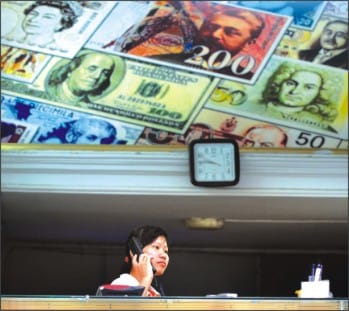In Vietnam, many see dollar as king

This photo taken on August 28 shows a young woman talking on a phone at a jewellery shop where people can also exchange money on a Hanoi street. From lowly rickshaw drivers to restaurants and high-end boutiques, the US dollar is readily accepted in communist Vietnam and street sales of the greenback are a profitable -- but illegal -- business. Photo: AFP
From lowly rickshaw drivers to restaurants and high-end boutiques, the dollar is a widely accepted currency in communist Vietnam -- except in the eyes of the government.
Thuy Hang, who owns a fashion shop in the centre of Hanoi, said having a supply of greenbacks in addition to the dong, the local currency, made perfect sense.
"The dong is always losing value. Inflation is still high. It's safer to have dollars," she says.
Analysts trace this widespread attitude to psychological factors rooted in the legacy of hyper inflation in Vietnam about 20 years ago as well as in more recent economic uncertainty.
"I sell my outfits in dong.... But sometimes I have foreign customers who pay me in dollars and I accept them. There's no reason to refuse them," Hang said, adding that she plays by the rules and has no problem accepting local currency too.
Officially, the dong is the only currency authorised for domestic transactions in Vietnam, where despite a booming market economy, communism remains the state ideology.
Vietnam regularly experiences official shortages of dollars but "never a shortage of dollars" on the black market, says a Hanoi gold dealer.
While the official exchange rate is about 17,000 dong to the dollar the black market rate is around 18,380.
One importer, who requested anonymity, complained that for two months it has been "impossible to buy dollars in the bank" so he has turned to unofficial channels where he says he can buy as much US currency as he wants.
This black market usually operates unhindered, but periodic crackdowns are a reminder of the government's determination to keep economic control.
For a while last year there was a shortage of dollars in the official market because of macro-economic imbalances, according to economists. Inflation peaked at 28.3 percent month-on-month that August and the trade deficit hit a record 17 billion dollars for the year.
Yet while the major economic indicators are more stable today, the Vietnamese economy and its currency still struggle to inspire confidence, according to merchants and economists.
Inflation slowed year-on-year to 8.31 percent in the first eight months of the year while in the same period the trade deficit fell an estimated 68 percent year-on-year to 5.1 billion dollars, official figures show.
Legislators have said they hope inflation can be kept below 10 percent in 2009, while the government aims for economic growth of around five percent.
That is still far from Vietnam's performance over the past decade. Growth reached 8.5 percent in 2007.
With the central bank holding significant reserves but reluctant to intervene too much, the state is not actually short of dollars but the Vietnamese and in particular, exporters, see the greenback as a safe haven and tend to hoard it, analysts say.
The global economic crisis may have spurred some to move assets out of dong and into dollars and gold, the International Monetary Fund (IMF) said.
A significant easing of monetary policy, as the government attempted to stimulate the economy, combined with the prospect of a substantial fiscal stimulus, may have reinforced these trends, it said.
A renewed widening of the trade deficit recently would have contributed too, the IMF added.
But above all, the reasons for the dollar shortage may be subjective.
Years of high inflation at the end of the 1980s and in the early 90s have left painful memories, analysts say. Inflation reached 874 percent in 1986.
"This psychology is difficult to reverse, even in countries such as Vietnam, which have enjoyed an extended period of tranquility," said IMF country representative Benedict Bingham.
Recent price rises have not helped. Vietnamese, well-informed about monetary issues, are sensitive to the slightest hiccups in their economy, analysts say.
The latest dollar shortage can be explained to a large extent by "psychological factors," said Cao Si Kiem, a former governor of the central bank.
"Part of the population, and companies, fear inflation will not ease, that the dollar will appreciate and the dong will fall," he says.
Rather than clamping down on foreign exchange transactions and driving the market underground, governments facing this situation need to gradually build "confidence in the domestic currency through sustained sound policies that erase the fears of the past," the IMF's Bingham said.
But escaping the "dollarised" economy will take time.
"We have to sensibly improve the situation... notably confidence in the dong," said Kiem.
Others doubt Vietnam's dong can ever win confidence, among them the importer.
Officials "will never be able to eliminate the black market for the dollar," he says. "The dong is very weak and is not certain to appreciate. You can't do business with dong anywhere. With the dollar, everything is easier.”

 For all latest news, follow The Daily Star's Google News channel.
For all latest news, follow The Daily Star's Google News channel. 




Comments